Centre for Civic Education (CCE), Center for Development of Non-Governmental Organizations (CRNVO), Institute Alternative (IA) and Center for Monitoring (CEMI) express serious concern about the work of the Administrative Committee, which has the responsibility of verifying documentation of the candidates for members of the RTCG Council. Bearing in mind that the governing structure is trying to render this process of its meaninglessness, we invite the interested public to closely monitor and influence it, in an attempt to ensure its lawful implementation.
Upon receiving applications from eligible candidates, the Administrative Committee has published on March 18, 2014, the so called List of Timely and Completed Applications of Candidates for Membership in the RTCG Council. Without any clear explanation and based on unknown and unlawful criteria, the number of letters of support for some candidates, mostly those proposed by the NGOs, was reduced. It is indicative that for the candidates Goran Đurović and Slavica Striković the letters of support from some of the leading critically-oriented Montenegrin NGOs were rejected as “untimely and incomplete” and that the letters of support from some northern and southern towns of Montenegro, associations of people with disabilities, etc, were not accepted as valid, even though they were submitted in the proper way and timely manner. In addition, minutes from this session of Administrative Committee are not publicly available. Consequently, it is not possible to know exactly which piece of information in the documentation of each candidate was missing or the manner in which the aforementioned list was determined, based on which the Administrative Committee rejected dozens of letters of support from NGOs of different profiles from throughout Montenegro and in that way discriminated vast number of NGOs, as well as candidates themselves.
In accordance with the Law on Free Access to Information, our representatives have since yesterday started gaining insight into an extensive documentation of all the candidates. On the basis of less than 30 percent of reviewed documentation, four of our representatives have already noticed numerous irregularities in the work of Administrative Committee. This further requires determining the accountability of the persons responsible for reviewing this documentation.
Based on the written above, CCE, CRNVO, IA and CEMI urge the Administrative Committee to nullify the list published yesterday, review the documentation again and, governed by the legal provisions and not by personal preferences, make the list of eligible candidates and rank them in a way prescribed by the law, namely, according to the number of received letters of support, bearing in mind that all other legal requirements are met as well.
Furthermore, CCE, CRNVO, IA and CEMI invite all nominated candidates to get actively involved in the process of verification of the documentation and thus contribute to the validity of this procedure. Nullifying the will of NGOs, introducing criteria based on someone’s party or familiar ties, violation of the law by the Parliament through introduction of double standards for documentation verification or incomprehensible „dilemma“ if „it is possible to eliminate a candidate because of bureaucratic procedure or verification of the application”, as well as public display on prejudice towards certain candidates by the members of the Administrative Board – represent concrete illegal actions and dangerous political messages that are in a complete contrast with the commitment of the government to establish a system of rule of law, especially when they come from the Parliament itself.
Centre for Civic Education (CCE)
Center for Development of Non-Governmental Organizations (CRNVO)
Institute Alternative (IA)
Center for Monitoring (CEMI)




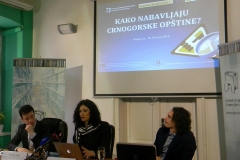
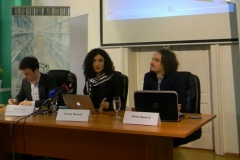

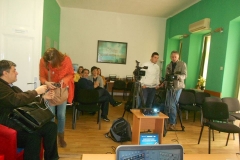
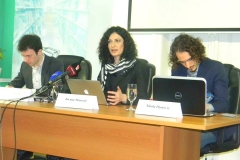
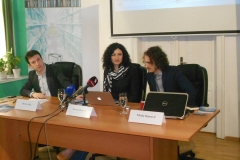
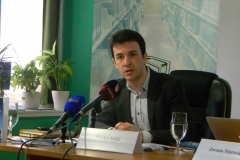
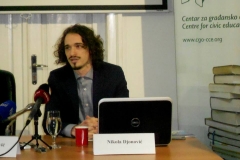
 It is not clear which problems the Government intends to solve by adopting this Law, since the Bill exposition was reduced to mere copying of the articles of the Law, as it happens rather often. The only concrete explanation of the need for the Law to be adopted was contained in the statement of Mr. Dusko Marković, given after the Cabinet meeting during which the Bill had been approved. Mr. Marković said that drafting of the Law was preceded by carrying out an analysis which indicated that the data produced by the intelligence sector “is not fully valorized”. It is necessary to stress that the analysis Mr. Markovic spoke about is not part of the exposition of this Law, nor, to our knowledge, is it available to the Parliament of Montenegro, respectively to the Defense and Security Committee which is mandated to discuss the Bill. Therefore, submission of this document to the competent committee should precede the deliberations in the Parliament.
It is not clear which problems the Government intends to solve by adopting this Law, since the Bill exposition was reduced to mere copying of the articles of the Law, as it happens rather often. The only concrete explanation of the need for the Law to be adopted was contained in the statement of Mr. Dusko Marković, given after the Cabinet meeting during which the Bill had been approved. Mr. Marković said that drafting of the Law was preceded by carrying out an analysis which indicated that the data produced by the intelligence sector “is not fully valorized”. It is necessary to stress that the analysis Mr. Markovic spoke about is not part of the exposition of this Law, nor, to our knowledge, is it available to the Parliament of Montenegro, respectively to the Defense and Security Committee which is mandated to discuss the Bill. Therefore, submission of this document to the competent committee should precede the deliberations in the Parliament.